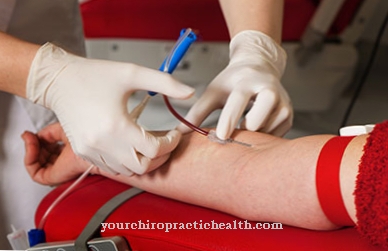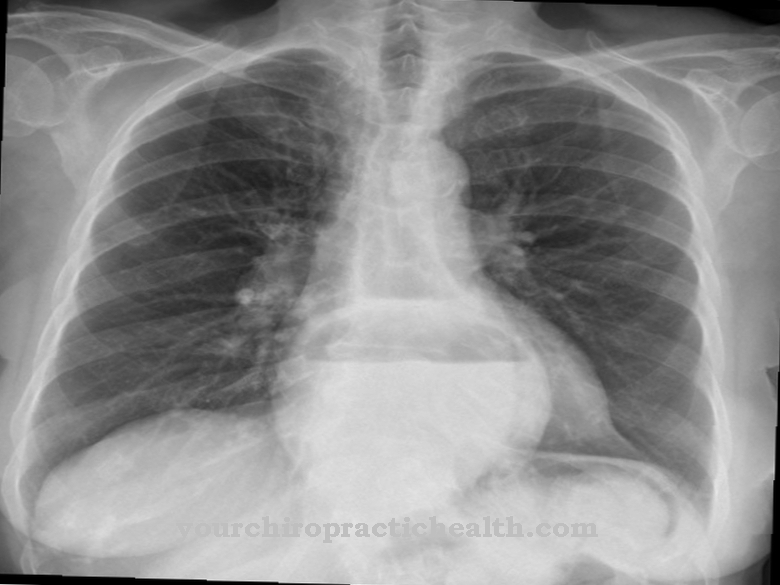The so-called Gallstone ileus refers to a rarely occurring complication in the area of gallstone disease, in which a gallstone loosened from the biliary tract causes an intestinal obstruction. About three percent of all intestinal obstruction is due to a gallstone. The gallstone ileus usually occurs in older patients.
What is gallstone ileus?

© timonina - stock.adobe.com
In technical jargon, the intestinal obstruction is called ileus. It represents a complete interruption of the normal intestinal passage of the small and large intestines. An incomplete occlusion is called a subileus. The term ileus comes from the Greek and means inclusion or union in the German translation.
If the intestinal passages are closed or obstructed in their passage, ingested food and fluids can no longer be transported. The contents of the intestine build up. If a bowel obstruction caused by a gallstone is called a gallstone ileus.
causes
Gallstone disease often causes inflammation that is not limited to the gallbladder alone. Rather, they also spread to the intestine, whose sensitive mucous membrane is destroyed in the process. The gallbladder then either breaks into the abdominal cavity or perforates the large intestine. This leads to a fistula that is called cholecystocolic or cholecystoduodenal.
In the case of a chronic course of the disease, a so-called aerobilie often forms, in which air accumulates in the biliary tract. In the course of the disease, chronic diarrhea and a lack of vitamin K occur. The gallstone ileus forms when a larger gallstone migrates into the intestine via the fistula that has formed. The intestinal obstruction can then be found in the fistula area or between the small and large intestines.
Symptoms, ailments & signs
A bowel obstruction or ileus triggers different symptoms, depending on the underlying cause of the disease. A general distinction is made between mechanical and functional intestinal obstruction. Mechanical ileus often causes severe abdominal pain, vomiting, gas accumulation in the bowel, and stool obstruction.
If a mechanical occlusion develops, the symptoms show a strongly active intestine as it tries to force its contents through the narrowed passage. This excessive activity of the intestine is known in technical terms as hyperperistalsis. The attending physician uses a stethoscope to listen to the abdomen.
Splashing and whistling noises can then be clearly heard over this. If the gallstone ileus is so advanced, those affected suffer from colicky pain. A hard and stiff bowel can be felt through the abdomen.
Diagnosis & course
The symptoms of intestinal obstruction vary greatly and depend on where the narrowed passage is located. However, it can be quickly differentiated whether the small or large intestine is affected. The doctor recognizes the mechanical closure by the symptoms that frequently occur, such as gas accumulation, lack of bowel movements, flatulence and vomiting.
The deeper occlusion in the small intestine does not initially cause vomiting. This occurs only in an advanced stage and shows a noticeably brown color with an unpleasant odor. In both cases, the patients suffer from severe abdominal pain, usually in the navel area. The so-called functional paralytic ileus has symptoms such as pain, belching, vomiting, and nausea.
If the doctor listens to the abdominal cavity, in contrast to the mechanical closure, he does not hear any intestinal noises. When a functional paralytic intestinal obstruction develops, the abdominal area is initially not hardened. There is an increased accumulation of gas. If the peritoneum is inflamed with this disease, the typical symptoms also change. The so-called drum belly appears, which tightens and hardens.
Complications
In most cases, the gallstone ileus is associated with very unpleasant complaints and symptoms. Most patients experience severe vomiting and severe pain in the stomach and intestines. Gas also accumulates in the intestine, which is associated with flatulence. The quality of life of the person affected is considerably reduced by the gallstone ileus.
There is also a so-called intestinal obstruction, which urgently needs to be treated by a doctor. Those affected often suffer from vomiting and dizziness. Belching can also occur. The constant pain and complaints often lead to psychological complaints or depression. It is not uncommon for those affected to withdraw from life and no longer actively participate in everyday life.
The gallstone ileus is usually treated with the help of medication and surgery. There are no complications. In most cases, the symptoms go away after a short time after the treatment and still do not occur. As a rule, however, the cause of the intestinal obstruction is then treated.
When should you go to the doctor?
If the person concerned suffers from abdominal pain and nausea, a doctor should be consulted as soon as the symptoms persist for several days or recur. If the pain spreads further into the abdomen, the doctor should be consulted. If flatulence, uncomfortable belching or a feeling of fullness in the body occur several times, a doctor is required for further examinations.
If the symptoms increase in intensity or additional symptoms occur, a doctor should be consulted. If you have a fever, a feeling of illness or general malaise, a doctor should be consulted to clarify the irregularities. Persistent constipation in spite of adequate fluid intake or undesirable problems with bowel movements must be investigated and treated. In the case of cramp-like symptoms in the upper abdomen, general physical weakness and decreased performance, a visit to the doctor is necessary to find out the causes.
If the person concerned can no longer carry out their daily duties as usual, they should seek the help and support of a doctor. Chronic diarrhea, persistent restlessness, and changes in the breathing system require medical treatment. If the person affected can feel indurations in the gastrointestinal tract with his fingers, this observation should be discussed with a doctor. Tensions that are not self-regulated are considered unusual and should be examined.
Doctors & therapists in your area
Treatment & Therapy
Treatment of gallstone ileus is often started with the insertion of a nasogastric tube. The cause of the occlusion is initially irrelevant. The attending physician has the option of removing the stomach contents via the tube of the gastric tube and thus contributing to the relief of the intestine.
Infusions also belong to the standard measure in the presence of a gallstone ileus. This is to ensure that all electrolytes and fluids lost through the intestine are replaced. A urinary catheter is placed so that the doctor can keep control of the fluids absorbed and lost.
It is also common to give the patient pain-relieving medication, which is supposed to relieve the symptoms associated with the intestinal obstruction such as pain, vomiting and nausea. If the intestinal muscles are paralyzed by the ileus, these non-invasive interventions may initially be sufficient.
However, if there is a so-called strangulation obstruction, which shows an interruption in the blood supply to the intestine as a result of a vascular constriction, further medication should be considered. This sets the motor skills of the intestine to a standstill again in motion by stimulating the peristalsis again. In this case, however, invasive surgery is not uncommon.
Outlook & forecast
The gallstone ileus generally has a good prognosis. If there are no other illnesses and the person concerned has a healthy immune system, a complete cure is possible within a few weeks. The diagnosis and therapy of the causal disorder is necessary for this, even though the current symptoms are alleviated in an initial medical treatment via a gastric tube.
The functional activity of the intestine is restored and monitored in a further therapy. In order to avoid further complications, the organism must be adequately supplied with fluid during the entire treatment period.
If the patient has also found an irregularity in the blood supply to the intestine, further medication steps are indicated. In a large number of cases, the gallstone ileus occurs in the elderly. They often have other diseases and their immune system is naturally often weakened.
As a result, the healing process can be significantly delayed. Post-treatment wound care is delayed and can lead to complications. The patient's quality of life is reduced.
Nevertheless, a gallstone ileus does not normally reduce the life expectancy. Psychological impairments can occur and the symptoms can return. In principle, the overall state of health must be taken into account in the prospect of complete freedom from symptoms.
prevention
Basically, the gallstone ileus can only be partially prevented. Basically, it should be ensured that there is no gallstone formation. An important aspect in preventing an intestinal obstruction is having regular bowel movements.
But diet also plays an important role. In any case, foods should be avoided that are difficult to digest, especially from personal experience, because these too can cause the formation of gallstones. Even after operations in the abdominal area, bowel obstruction often occurs. These are then called postoperative ileus.
For this reason, it is important to pay special attention to typical symptoms such as pain, vomiting, gas accumulation and a lack of stool after such operations. If these occur, a doctor should be consulted immediately.
You can do that yourself
The gallstone ileus is a life-threatening disease that requires immediate surgical treatment. If the gallstone ileus is not operated on immediately, the patient will die from it. The occurrence of gallstone ileus is extremely rare.
It cannot be diagnosed by the patient himself; a diagnosis can only be made using an imaging procedure. The gallstone ileus is by no means the result of untreated gallstones, but only a very rare form of a secondary disease. If the informed and informed patient suspects the possibility of a gallstone ileus in himself, a doctor or the hospital must be consulted immediately.
However, after a successful operation and the reintegration of the patient into his everyday life - usually after completing an appropriate rehab measure - there are ways in which the patient can actively support and promote his healing and recovery. Here it depends on a balanced organization of everyday life: Activity and sufficient rest periods should be balanced.
Light physical activities, such as going for a walk in the fresh air, have a positive effect on the cardiovascular system, general well-being and condition. In this way, the body can be strengthened and recover from the operation. Adhering to the diet prescribed by a doctor and avoiding alcohol are also important.




.jpg)

.jpg)

















.jpg)



